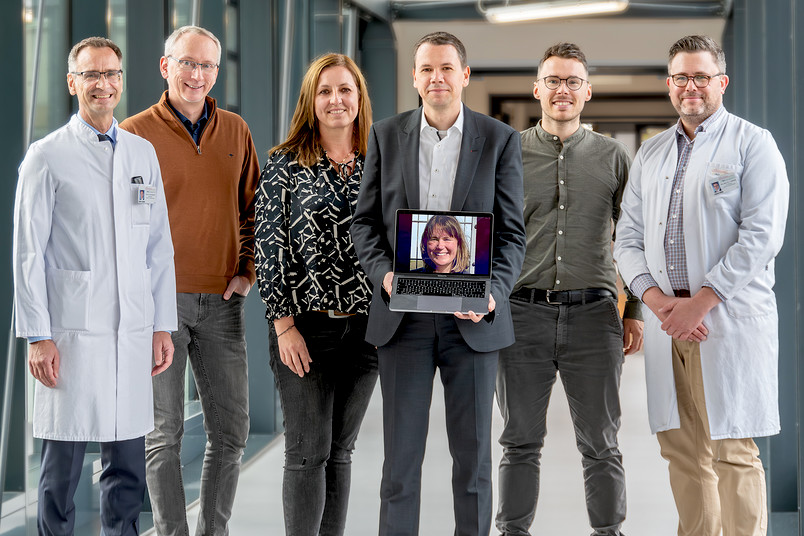
NEW PROJECT | KI.SEP: AI in The Optimization of Antibiotic Dosing in Sepsis
aimed analytics proudly announces its collaboration in the KI.SEP project—ushering in a new era of sepsis treatment with the power of artificial intelligence. Join us on a journey where innovation meets patient care, setting the stage for a transformative chapter in healthcare.
Pioneering Progress: aimed analytics Drives Innovation in Sepsis Treatment Through KI.SEP Project
Embarking on a groundbreaking initiative to elevate patient safety and treatment efficacy, aimed analytics GmbH is proud to announce its active role in the KI.SEP project. In collaboration with Knappschaftskrankenhaus Bochum University Hospital and Ruhr University Bochum, our company is at the forefront of a transformative endeavor, leveraging artificial intelligence (AI) to optimize antibiotic dosing in the treatment of sepsis.
The Power of AI in Sepsis Treatment
Sepsis, a life-threatening condition demanding swift intervention, necessitates precision in antibiotic dosing. Recognizing this imperative, the KI.SEP project, led by Professor Dr. Barbara Sitek at Knappschaftskrankenhaus, integrates AI to revolutionize antibiotic dosing and enhance treatment outcomes.

Collaborative Commitment to Patient-Centric Solutions
The collaborative synergy within the KI.SEP team, uniting experts from Ruhr University Bochum and aimed analytics GmbH, underscores our commitment to advancing patient care. Professor Dr. Michael Adamzik, Director of the Department of Anaesthesiology, Intensive Care Medicine, and Pain Therapy, expresses excitement about the collaboration and foresees significant progress in patient care through the integration of AI.
Dr. Patrick Günther, founder and Managing Director of aimed analytics GmbH in Bonn, underscores the indispensable role of AI in fully realizing the potential of extensive medical data in the intensive care unit. The KI.SEP team is dedicated to developing innovative solutions that not only enhance patient safety but also streamline the efficiency of sepsis treatment.
 "The extensive medical data of a patient in the intensive care unit provides us with valuable insights for optimal treatment. But to fully exploit this potential, support from artificial intelligence is essential."
"The extensive medical data of a patient in the intensive care unit provides us with valuable insights for optimal treatment. But to fully exploit this potential, support from artificial intelligence is essential."
Project Dynamics and Key Players
In a multidimensional approach, the KI.SEP project comprises four sub-projects led by distinguished professionals within the Department of Anaesthesiology, Intensive Care Medicine, and Pain Therapy at the University Hospital Knappschaftskrankenhaus Bochum. Additional sub-projects at Ruhr University, hosted by the Medical Proteome Center and the Chair of Applied Microbiology (CESAR), contribute to the holistic success of the initiative. Coordinated by aimed analytics GmbH, this project underscores the pivotal role of data analytics in driving success.
About Participating Institutions
University Hospital Knappschaftskrankenhaus Bochum: As a community hospital turned university hospital of Ruhr University Bochum, this institution, founded in 1909, is dedicated to providing innovative diagnostic and therapeutic procedures.
aimed analytics GmbH: Based in Bonn, Germany, we specialize in the analysis of biomedical data, recognized as one of the "Top 10 Big Data & Analytics Startups disrupting Healthcare in 2023."
Center for Systems-based Antibiotics Research (CESAR): Opened in 2023 at Ruhr-Universität Bochum, CESAR is an NRW research infrastructure dedicated to global analysis methods for discovering new antibacterial agents.
Medical Proteome Center (MPC) and CUBIMed.RUB: MPC, a leading institute for proteome and protein analysis, employs mass spectrometry and innovative bioinformatics. CUBIMed.RUB offers cooperation and infrastructure for bioinformatics.
ZukunftBIO.NRW's Catalyst for Innovation
We extend our deepest gratitude to ZukunftBIO.NRW for recognizing the potential of our contributions and generously funding this transformative initiative. Committed to promoting innovative projects, ZukunftBIO.NRW plays a crucial role in advancing the healthcare sector in North Rhine-Westphalia.
Summing Up ...
The KI.SEP project, spearheaded by aimed analytics, marks a significant milestone in the convergence of healthcare and artificial intelligence. By optimizing antibiotic dosing in sepsis treatment, the project aims not only to improve patient outcomes but also contribute to the global effort in reducing antibiotic resistance.
The collaborative spirit of the participating institutions and the support from ZukunftBIO.NRW exemplify a collective dedication to pushing the boundaries of medical innovation for the benefit of patients worldwide. As the project unfolds, it holds the promise of reshaping the landscape of sepsis treatment and setting new standards in personalized and efficient care.
... and Personal Concluding Thoughts
At aimed analytics, we are immensely proud to be a pivotal part of the KI.SEP project, a venture that embodies the fusion of cutting-edge technology and compassionate healthcare.
The opportunity to collaborate with esteemed institutions like Knappschaftskrankenhaus Bochum University Hospital and Ruhr University Bochum in revolutionizing sepsis treatment is a testament to our commitment to advancing biomedical data analysis.
We extend our deepest gratitude to ZukunftBIO.NRW for recognizing the potential of our contributions and generously funding this transformative initiative.
Our team is dedicated to harnessing the power of artificial intelligence to make a meaningful impact on patient care, and we eagerly anticipate the positive outcomes that the KI.SEP project will bring to the forefront of medical innovation.
Together, we embark on a journey that not only showcases the capabilities of AI in healthcare but also underscores our collective dedication to improving lives through groundbreaking research and technological advancements.
Let's all work together, appreciate each other and keep it up!
Further Recommendations
Read more about the KI.SEP project here.
Background | Challenges in Antibiotic Dosing for Sepsis Treatment
The treatment landscape for sepsis, a life-threatening condition triggered by the body's overwhelming response to infection, is fraught with complexities, particularly in the realm of antibiotic dosing. Achieving optimal antibiotic dosing in sepsis is a formidable challenge, necessitating a delicate balance between efficacy and avoiding potential adverse effects.
One of the primary challenges lies in the heterogeneity of sepsis cases, where patients exhibit diverse clinical presentations and responses to infections. This heterogeneity complicates the establishment of standardized antibiotic dosing protocols, as what works effectively for one patient may not be equally efficacious for another.
Dynamic Nature of Sepsis Progression: Adapting Dosages Over Time
The dynamic nature of sepsis progression further amplifies the difficulty in predicting the optimal dosage over the course of treatment. The intricate interplay between host factors, microbial characteristics, and the pharmacokinetics/pharmacodynamics (PK/PD) of antibiotics adds another layer of complexity.
Complex Interplay of Factors: Hurdles in Achieving Precision
The intricate interplay between host factors, microbial characteristics, and the pharmacokinetics/pharmacodynamics (PK/PD) of antibiotics adds another layer of complexity. Factors such as organ dysfunction, variations in drug metabolism, and the emergence of antibiotic-resistant strains contribute to the challenge of determining the right dosage for individual patients.
Time Sensitivity in Sepsis: Urgency vs. Precision
Furthermore, the time-sensitive nature of sepsis treatment compounds the dosing dilemma. Rapid initiation of antibiotic therapy is crucial for improving patient outcomes, yet the urgency can lead to challenges in precisely tailoring dosages based on comprehensive patient-specific data.
Multidisciplinary Approach: Integrating Technology for Precision
Addressing these challenges requires a multidisciplinary approach that integrates advanced technologies, such as artificial intelligence (AI), into the treatment paradigm. The KI.SEP project, spearheaded by aimed analytics GmbH, acknowledges the intricacies involved in antibiotic dosing for sepsis and aims to leverage AI to enhance precision.
Conclusion: Advancing Precision in the Face of Complexity
In conclusion, the difficulty in antibiotic dosing for sepsis treatment stems from the multifaceted nature of the condition and the diverse factors influencing drug efficacy and safety. As we delve into the future of healthcare innovation, acknowledging and addressing these challenges becomes imperative. The journey towards precise antibiotic dosing in sepsis treatment is a testament to the resilience of medical science and the commitment to advancing patient care in the face of complex medical scenarios.